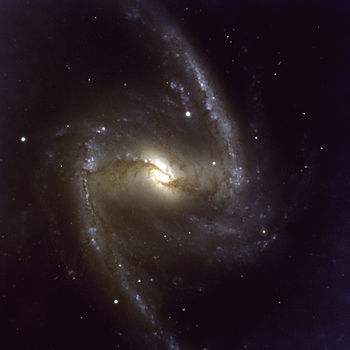NGC 1365
| NGC 1365 | |
|---|---|

Credit:ESO
|
|
| Observation data (J2000 epoch) | |
| Constellation | Fornax |
| Right ascension | 03h 33m 36.4s |
| Declination | −36° 08′ 25″ |
| Redshift | 1636 ± 1 km/s |
| Distance | 56.2 ± 2.6 Mly (17.2 ± 0.8 Mpc) |
| Apparent magnitude (V) | 10.3 |
| Characteristics | |
| Type | (R')SBb(s)b |
| Apparent size (V) | 11′.2 × 6′.2 |
| Other designations | |
| PGC 13179 | |
NGC 1365, also known as the Great Barred Spiral Galaxy, is a barred spiral galaxy about 56 million light-years away in the constellation Fornax. The core is an oval shape with an apparent size of about 50″ × 40″. The spiral arms extend in a wide curve north and south from the ends of the east-west bar and form an almost ring like Z-shaped halo. The central mass in active galactic nucleus rotates close to relativistic limit (the dimensionless spin parameter is larger than 0.84).
Supernovae 2012fr, 2001du, 1983V, and 1957C were observed in NGC 1365.
In February 2013, observations using the NuSTAR satellite have found out that the central supermassive black hole of NGC 1365, measured to be about 2 million solar masses in mass, is spinning at almost the speed of light.
NGC 1365's central region showing dust lanes.
This video sequence shows the rapid brightening and slower fading of a supernova explosion in the galaxy.
An ultraviolet image of NGC 1365 taken with GALEX.
Credit: GALEX/NASA.
HAWK-I infrared image of the barred spiral galaxy NGC 1365.
Credit: ESO/P. Grosbøl.
...
Wikipedia
